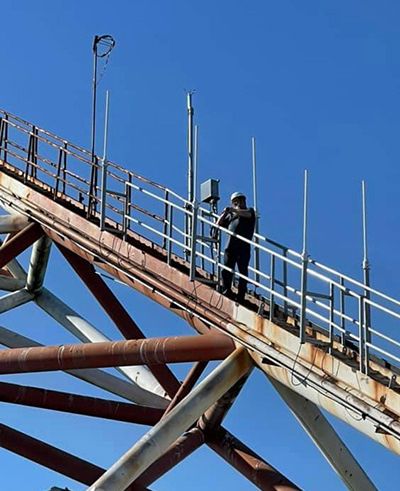Our Members Work Where the Aviation Equipment Is!
- Details
- Published: May 31, 2022
 |
Americans have returned to air travel this year in numbers not seen since before the pandemic began. They encounter TSA officers, gate agents and flight crews on their journey. They know there are controllers in the airport tower giving instructions to the pilots. But behind the scenes, thousands of PASS-represented employees at the Federal Aviation Administration (FAA) and Department of Defense (DoD) are there to ensure the flight crews are following proper procedures; airplanes are maintained and certified; radar, communication and navigation equipment is inspected and maintained; and so much more. And when that equipment is in the Gulf of Mexico, our members are there as well. Maintaining and repairing the complicated equipment and systems that support air traffic control is not as easy as making an appointment at the Apple Genius Bar and bringing your laptop or iPad to the store. You have to go to the equipment.
Earlier this spring, PASS members Rob Gordon and Clyde Hunt traveled by helicopter to an unmanned feeder oil platform in the Gulf to commission a Remote Center Air/Ground (RCAG) site. It’s a pass-through location to a main production platform for material and equipment, Gordon explained, so vital to the oil industry. Because of the pandemic, maintenance of equipment on oil platforms was not being done. “But now we’re starting back up,” he said. “There are eight or nine platforms between New Orleans and Lafayette,” he continued. “There is lots of corrective and periodic maintenance to be done,” including going out on a boom over the water to check antennas. They also do radio and battery maintenance and help with repairs to the facility. Depending on the amount of time needed for the work, the FAA techs may be out there for two to five nights. Hunt works out of Lafayette, La., while Gordon is based in New Orleans.
Because of the risky nature of the work and the potential hazards that workers could be exposed to, there are early morning safety meetings each day and the platform workers call their time out on the water “living on the bomb.” One only needs to remember the Deepwater Horizon disaster in 2010 to see why. “Those people are a special breed,” said Gordon. “They stay out there for weeks at a time and with sketchy internet, it’s hard to keep in touch with family.”
One morning, alarms began going off at 1 am, the power went out and with the others, Hunt and Gordon donned PPE gear to prepare to jump overboard if they needed to be rescued; the platform is 80 feet above the water. Due to the lack of proper maintenance during the pandemic, Gordon explained, a lot of sensors were beginning to fail. It was a gas alarm and although no gas leak was detected, they remained in their gear for about two hours.
It's not all work though. Gordon says that building camaraderie with the off-shore partners is important. “Maintaining good relationships with the guys on the platform is critical so they don’t have problems with FAA.” While some of the off shore facilities have their own cooking and cleaning personnel, many were put on hiatus because of the pandemic. Gordon and Hunt pitched in to help with the daily cooking and laundry, which was greatly appreciated by the crew.
“I like going out there,” said Gordon. “It gives us something different to do but when we’re done, we are ready to go!”
Their portion is done on this platform but there will be more time spent in the Gulf of Mexico to come. All in the service of aviation safety and the flying public!




